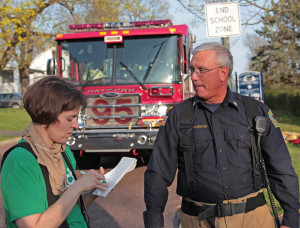Just like interviews with prospective employers are key to securing a job and in some cases a career, question and answer sessions with reporters are integral to building upon the foundation for a successful business venture or nonprofit organization.
Knowing how and what to say during media interviews can be tricky for new entrepreneurs. But, with this guide of helpful hints, even the most media un-savvy small business owner can win at telling their story, increasing awareness of their brand and ultimately expanding their reach.
You achieved the most difficult part of media coverage: Getting a reporter’s attention. Now come to the interview prepared by reviewing any business or event-specific details that may warrant a refresher. That’s not to say that you should memorize dates and company statistics, but at least have them handy.
- Follow through
If you are unsure of an answer to a question that a reporter poses simply say that you don’t know – and take steps to get the answer. The press is bombarded with hundreds of coverage requests on a daily basis. Don’t make them jump through hoops to obtain the information needed. If a reporter is interested in sharing your story do your due diligence and provide what’s needed.
- Avoid one-word answers
Sometimes one word works just fine – except in instances where someone is using your words to tell your story. Exemplify what your business or organization embodies by sharing relevant anecdotes, personal stories or reflecting on early beginnings versus today and projections for the future.
- Answer the “why”
Journalists in their reporting answer who, what, where, when, why and how questions. But, the “why” behind a story’s significance can vary between reporter and business owner. Be sure to express the significance behind your company or organization, highlighting what sets you apart from the competition, any niche you may have carved and any other tidbit of information that you would want prospective customers or members to know.
- Don’t overstate
While you want to talk enough for effective sound bites or quotes, you don’t want overdo it. If there is one point you want to drive home focus on that rather than four other less-important ones. No matter how well a story is reported, the reality is that roughly 10 percent (or less) of the notes taken or video filmed during an interview will make it into the final product. Giving too many examples or referencing more points than necessary will lead to the reporter selecting what they feel is best to highlight. That may not always mesh well with what you deem as the most important part of a story from a business or organizational standpoint.
- Say what you mean
Reporters are sometimes accused of misquoting people or taking something out of context. Certainly that may be the case some of the time. But, in other instances the person being interviewed knows what they want to convey, but may have not explained it properly. Don’t leave it up to a reporter to determine what you meant to say. Share only what you would not mind reading or hearing verbatim in the finished story.
Theresa Katalinas has interviewed hundreds of small business owners, local government and school officials and other prominent figures through her previous decade-long work as a newspaper and multi-media digital reporter and editor. She now uses her media expertise to tell the stories of her clients and coordinate relevant press coverage. To learn more about public relations services through Katalinas Communications call 215-519-8833 or email katalinascommunications@gmail.com.
Join Theresa at SCORE Bucks County’s sales and marketing workshop on June 13 from 9 a.m. to 1:30 p.m. at Homewood Suites, 2650 Kelly Road in Warrington. Theresa will be answering questions as part of the publicity panel. For more information or to register for the workshop, click here.



